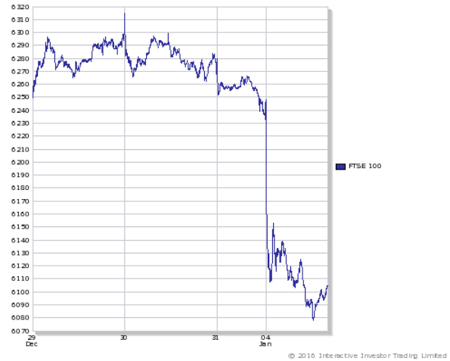FTSE 100 has worst start to year since 2000
4th January 2016 14:11
by Harriet Mann from interactive investor
Like the spectacular firework displays which signalled the beginning of 2016, global markets have certainly started the new year with a bang. Share trading in China was suspended on Monday after another weak manufacturing report had the local stockmarket in freefall. That's bad both for the global economy, and the , which has suffered its worst opening day of a calendar year since 2000.
Chinese manufacturing contracted for a fifth consecutive month, according to China’s National Bureau of Statistics at the weekend, while the latest Caixin/Markit manufacturing purchasing managers index (PMI) has remained below 50, implying contraction, for a tenth month.
The Shanghai Composite Index was suspended after sinking as much as 7%. It's the first time such measures, introduced by Chinese regulators to limit losses following the crash last summer, have been used in anger. But while the economic data is a worry, an end to a ban on short-selling in China next week is a real concern.
The UK's blue-chip index followed suit, slumping by as much as 165 points, or 2.64%, to 6,077, almost completely unwinding gains made during Christmas week. It was even worse than last year's 161-point, or 2.46%, slump. In fact, the FTSE 100 has not started a year so badly since the final day of trading in 1999 marked an all-time high for the index. Then, it fell from 6,930 to a low of 6,662 on 4 January.
"The extreme reaction of investors in China, ignoring a more upbeat non-manufacturing PMI gauge, suggests that the market is highly risk averse and New Year cheer is in short supply," said Rebecca O'Keeffe, head of investment at Interactive Investor.

(Click to enlarge)
It's no surprise that miners and suffered the largest losses on the UK's blue-chip index Monday. The shares had fallen 8% to 274p and 7% to 84p by mid-morning respectively, while peer sank 5% to 446p.
Reliance on China's economy for the health of global miners has seen the FTSE 350 Mining index more than halve in the past year, from 15,215 to just 7,046. From 12-month highs, Anglo's market value has plummeted by over two-thirds, Glencore's by 73% and Antofagasta by 45%.
Oil prices also rallied after OPEC leader Saudi Arabia executed a Shi'ite Muslim cleric and cut ties with Iran. As Iran is soon to return to the oil market, a barrel of Brent crude rose by 1.5% to $37.82. still fell 3% to 344p, slipped 2% to 1,518p and soon-to-be partner 1% to 972p.
However, this does not yet signal the start of an oil price rally, warns O'Keeffe.
"With tensions rising between Saudi Arabia and Iran, oil prices received a brief fillip, but even with this heightened geopolitical risk, weak fundamentals may ensure that prices continue to languish at multi-year lows."
remains in the firing line Monday, down 5%, following a year plagued by profits warnings triggered by China's slowdown, the collapse in commodity prices and low interest rates.
Not all miners felt the brutal force of China's influence, however. ticked 2% higher to 4,229p as the gold price rose by around 1% to $1,070 an ounce, with investors favouring its safe-haven status amid heighted geopolitical concerns.
Also breaking the trend was travel group and airline , which both inched slightly higher to 1,219 and 1,753p respectively.
This article is for information and discussion purposes only and does not form a recommendation to invest or otherwise. The value of an investment may fall. The investments referred to in this article may not be suitable for all investors, and if in doubt, an investor should seek advice from a qualified investment adviser.